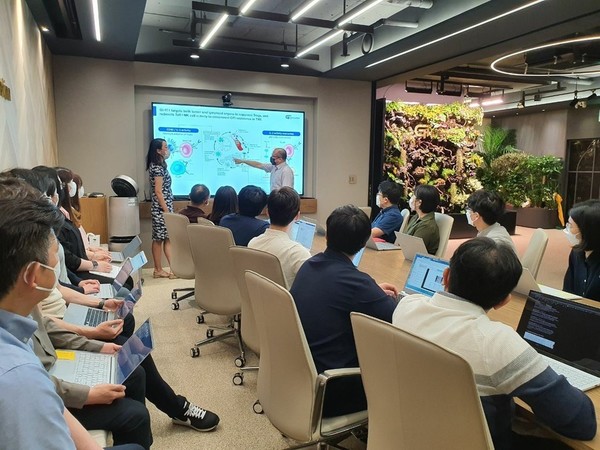GI Innovation said it would soon begin the global trial of GI-101, its major pipeline immunotherapy.
As the company plans to go public on Kosdaq in the second half, its recent 160 billion won ($143.1 million) pre-IPO placement has drawn attention to whether it will become an innovative drug developer.
On Saturday, GI Innovation said it obtained the FDA’s nod for a phase-1/2 trial of GI-101.
As the company won the Ministry of Food and Drug Safety’s approval for a local phase-1/2 study in April, the company will simultaneously conduct global trials in the U.S. and Korea.
GI Innovation said the Covid-19 pandemic would not have a significant impact on the U.S. trial.

“With the Covid-19 vaccination, the pandemic situation in the U.S. has much abated now,” an official at GI Innovation said. “We will recruit a small number of participants according to each cancer type in the phase-1 study and decide whether to conduct a phase-2 study. There will be no impact on patient recruitment.”
The global phase-1/2 trial of GI-101 will test the drug candidate in 374 patients – 250 local and 124 international patients – with 12 solid cancers.
Despite the early stage, the trial is a large-scale one involving over 400 people.
GI Innovation said the number of participating patients could increase depending on the speed of patient recruitment and development of each cancer type.
The phase-1/2 trial has been designed for “seamless” where monotherapy and combination therapy are conducted in one protocol, “basket trial” for evaluation of various cancers, and “adaptive” for expansion for cancers that respond well to the drug.
Accordingly, the phase-1/2 study will consist of four parts for patients with advanced or metastatic solid cancer -- a single administration of GI-101, a combination of GI-101 with MSD’s Keytruda (ingredient: pembrolizumab), a combo of GI-101 with multikinase inhibitor Lenvima (lenvatinib), and a combo of GI-101 with radiation therapy (RT).
Among them, MSD will provide Keytruda for free for 200 patients treated with the combo of GI-101 and Keytruda.
Yun Na-ri, a director at GI Innovation, said the approval for the global, large-scale phase-1/2 trial of GI-101 showed the company’s strength through close collaboration between departments.
“The approval is particularly meaningful because it recognized our technological power in the double fusion protein, which is known to be difficult to develop due to its complex structure,” she said.
Having lots of discussions with MSD, GI Innovation designed the trial mainly for carcinomas expected to have the best anticancer activity, Yun went on to say.
“We have high expectations because we can jointly analyze data after the start of the trial utilizing MSD’s immuno-oncology development know-how.”
To conduct such a large-scale study, GI Innovation recently attracted pre-IPO worth 160 billion won.
GI Innovation said it would expand the global trial and push for new pipelines with the raised funds.
Along with the U.S. and Korea trials, the company plans to focus on developing pipelines such as new immuno-oncology double fusion protein, an antibody treatment, and nonalcoholic steatohepatitis (NASH) treatment candidate.
GI Innovation is soon to submit a preliminary review application for the Kosdaq listing in the second half. The leading underwriters are NH Investment & Securities and Hana Financial Investment.

